What Is Speed Drug?

An Introduction to Speed as a Drug
Speed is a colloquial term for certain stimulant drugs with powerful effects on the central nervous system. Known scientifically as amphetamines, these substances can be prescribed medically but are also widely misused for their energizing and euphoric properties. Speed is often associated with amphetamines like methamphetamine, which are known for their potential for abuse and addiction. As we explore the nature of speed, we aim to understand its uses, effects, and risks.
The Nature of Speed and Its Chemical Identity
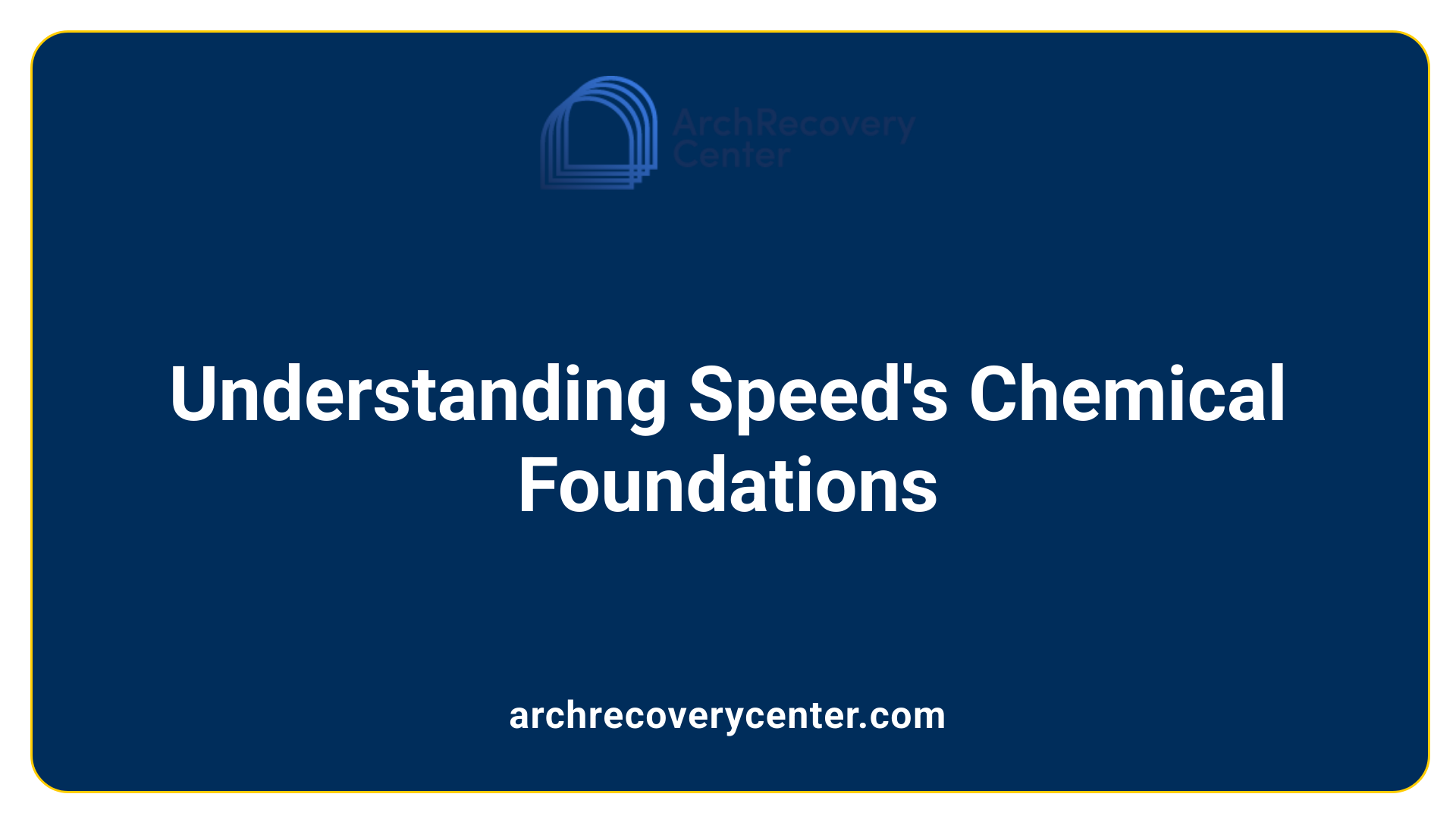
What is the chemical name for speed?
The chemical name for speed is amphetamine, scientifically designated as α-methylphenethylamine according to IUPAC nomenclature. Amphetamine is classified within the phenethylamine family and has a molecular formula of C9H13N with a molecular weight of 135.2 g/mol. This synthetic substance is predominantly found in the form of a white powder.
How does speed act as a stimulant?
Amphetamines like speed act as powerful central nervous system stimulants, increasing the release and activity of key neurotransmitters in the brain, particularly dopamine and norepinephrine. The result is enhanced alertness, energy, and cognitive function. Therapeutically, they are prescribed to treat conditions such as ADHD and narcolepsy, as well as to aid in weight management.
However, the addictive potential of speed is notable; improper use can lead to severe health complications, including cardiovascular issues, mental health disorders, and dependence. Understanding its chemical makeup highlights why speed can deliver both benefits and risks to users, especially in recreational contexts.
| Aspect | Details |
|---|---|
| Chemical Name | Amphetamine (α-methylphenethylamine) |
| Molecular Formula | C9H13N |
| Common Forms | White powder, tablets |
| Clinical Use | Treats ADHD, narcolepsy, weight management |
| Risks of Misuse | Addiction, cardiovascular issues, mental health complications |
Uses of Amphetamines and Risks of Speed
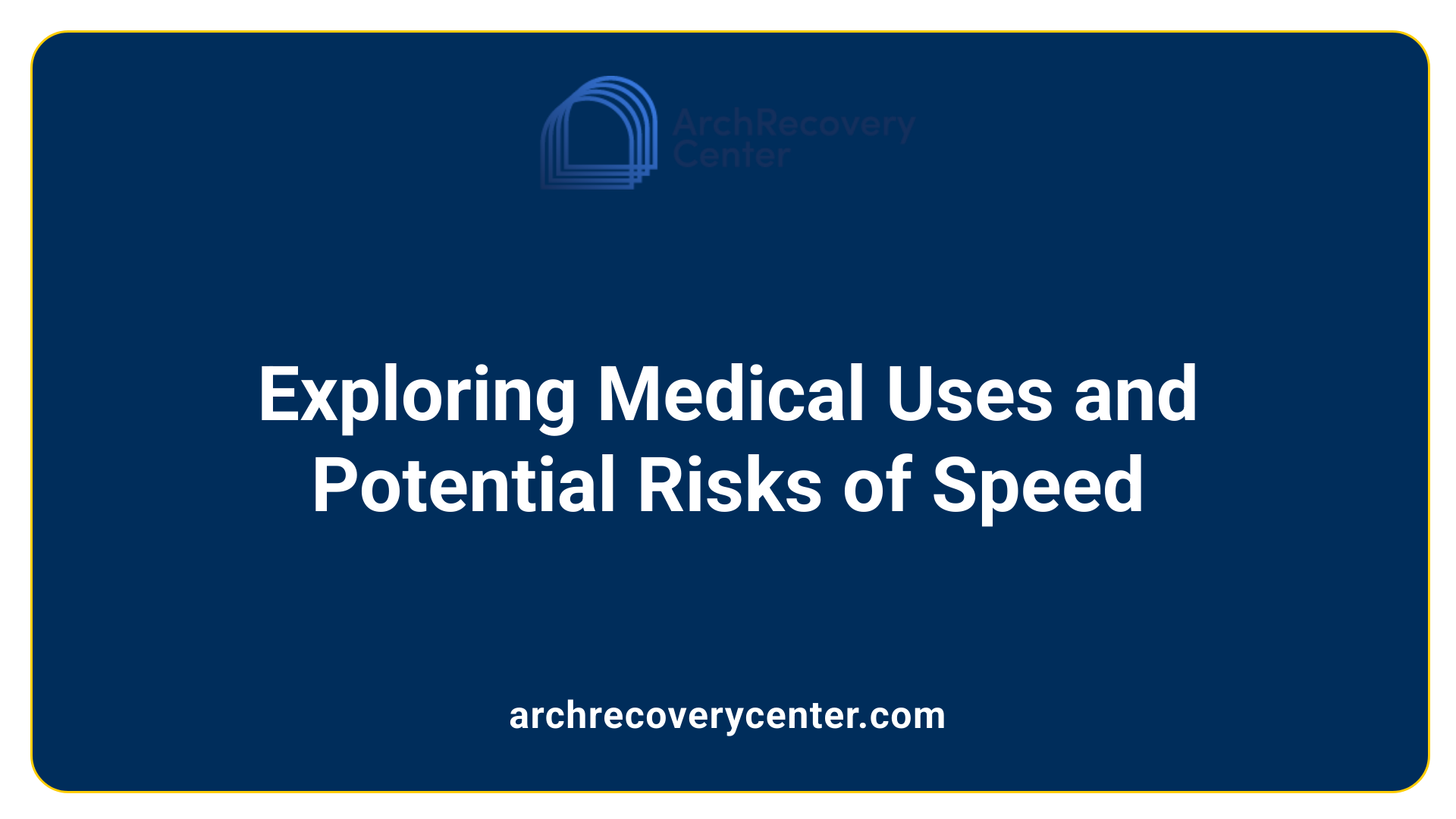
What are the uses of amphetamines?
Amphetamines serve primarily as prescription medications for several conditions. They are frequently used to treat Attention Deficit Hyperactivity Disorder (ADHD) and narcolepsy. By increasing levels of neurotransmitters like dopamine and norepinephrine, these stimulants help improve focus, enhance alertness, and reduce excessive daytime sleepiness. In certain cases, amphetamines are also utilized to manage depression, particularly when other treatments have failed to yield results.
Illicit use as 'speed'
Misuse of amphetamines often manifests in the form of recreational use, commonly referred to as "speed." This potent version typically involves greater dosages and alternative methods of intake, such as snorting or injecting, leading to a quicker and more intense high. Users seek the euphoric effects, lack of appetite, and increased stamina often associated with the drug. However, this illegal use comes with severe consequences, including a high potential for addiction and various mental health issues.
Health risks and addiction concerns
The health risks of amphetamines are significant. Physical side effects can include increased heart rate, high blood pressure, insomnia, and appetite suppression, which may lead to malnutrition. Furthermore, the risk of addiction is heightened due to the intense pleasure experienced during use. Conversely, withdrawal can provoke a range of symptoms, including fatigue, depression, and anxiety, making cessation challenging. Chronic use is linked with severe mental health conditions, and studies show alarming statistics, such as over 34,000 overdose deaths related to methamphetamines in 2022.
| Aspect | Details | Health Concerns |
|---|---|---|
| Therapeutic Uses | ADHD, narcolepsy, depression | - Dependency risk |
| Illicit Use (Speed) | Increased energy, euphoria, appetite suppression | - High potential for addiction |
| Health Risks | Increased heart rate, insomnia, potential for psychosis | - Long-term damage to brain and cardiovascular health |
Speed vs. Prescription Stimulants: Unpacking the Differences
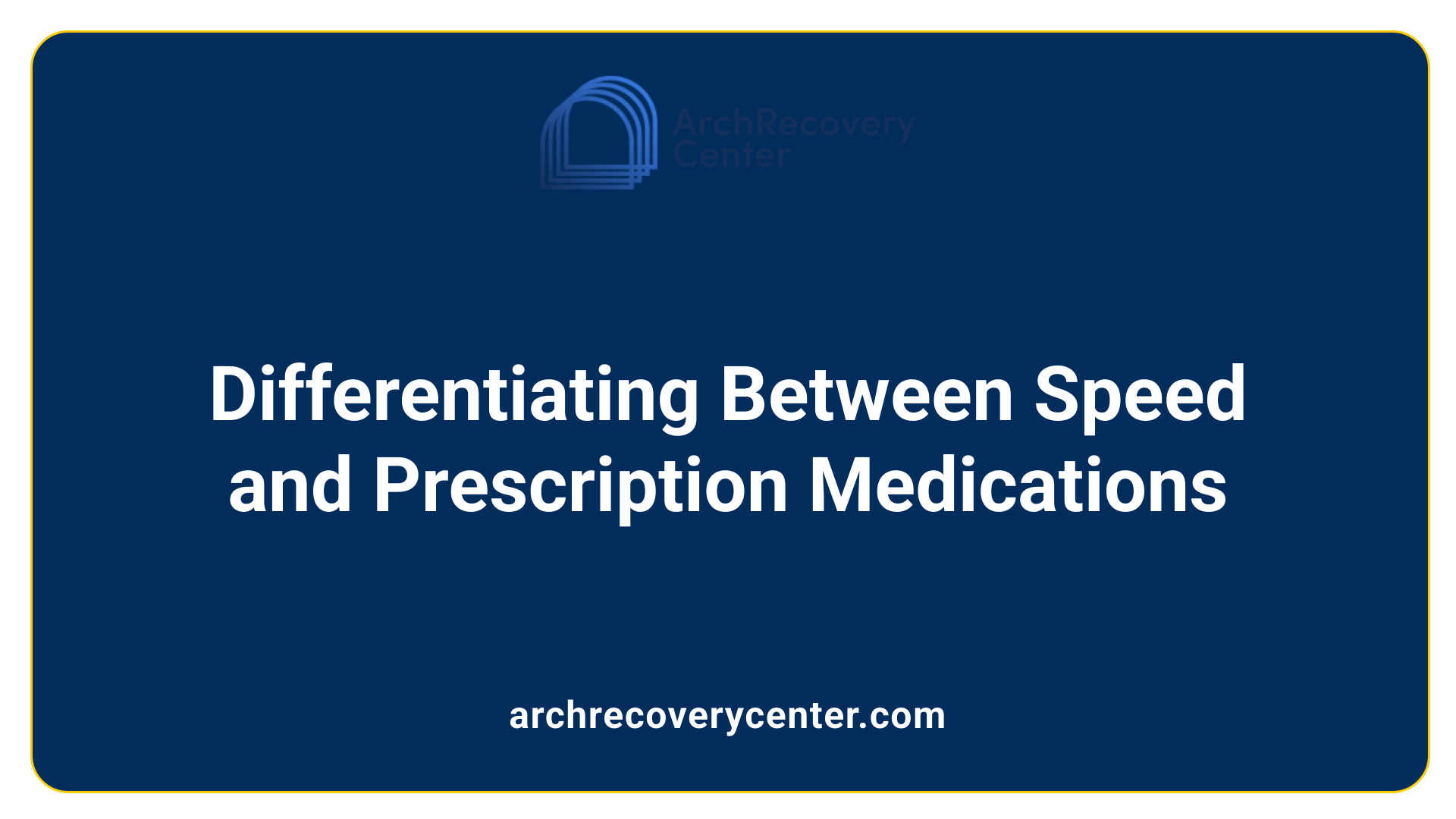
Is speed the same as Adderall?
No, speed is not the same as Adderall. Adderall is a prescription medication that contains a combination of amphetamine and dextroamphetamine, primarily used to treat ADHD and narcolepsy. It is classified as a Schedule II controlled substance due to its potential for abuse.
In contrast, 'speed' often refers to methamphetamine, which is more dangerous and addictive than Adderall and is typically used illicitly. While both substances are stimulants with the potential for addiction, methamphetamine carries a higher risk of immediate dependence and greater health risks when used.
Adderall is prescribed for legitimate medical conditions and can be safer when taken as directed. Speed, on the other hand, is frequently associated with illicit use, resulting in severe health consequences.
Risks Associated with Methamphetamine
Using methamphetamine, commonly referred to as speed, can lead to several serious health risks. Some of these include:
- Cardiovascular Problems: Increased heart rate and blood pressure can lead to heart disease.
- Psychological Effects: Chronic use can result in anxiety, paranoia, and psychosis, mirroring symptoms of schizophrenia.
- Addiction Potential: Methamphetamine is extremely addictive, with users often developing a dependence that prompts compulsive drug-seeking behaviors.
- Physical Health Consequences: Long-term abuse may lead to severe dental problems, known as 'meth mouth', and other physical damage to the body.
Recognizing these differences is crucial for understanding the potential dangers associated with these substances.
Methamphetamine: A Potent Form of Speed
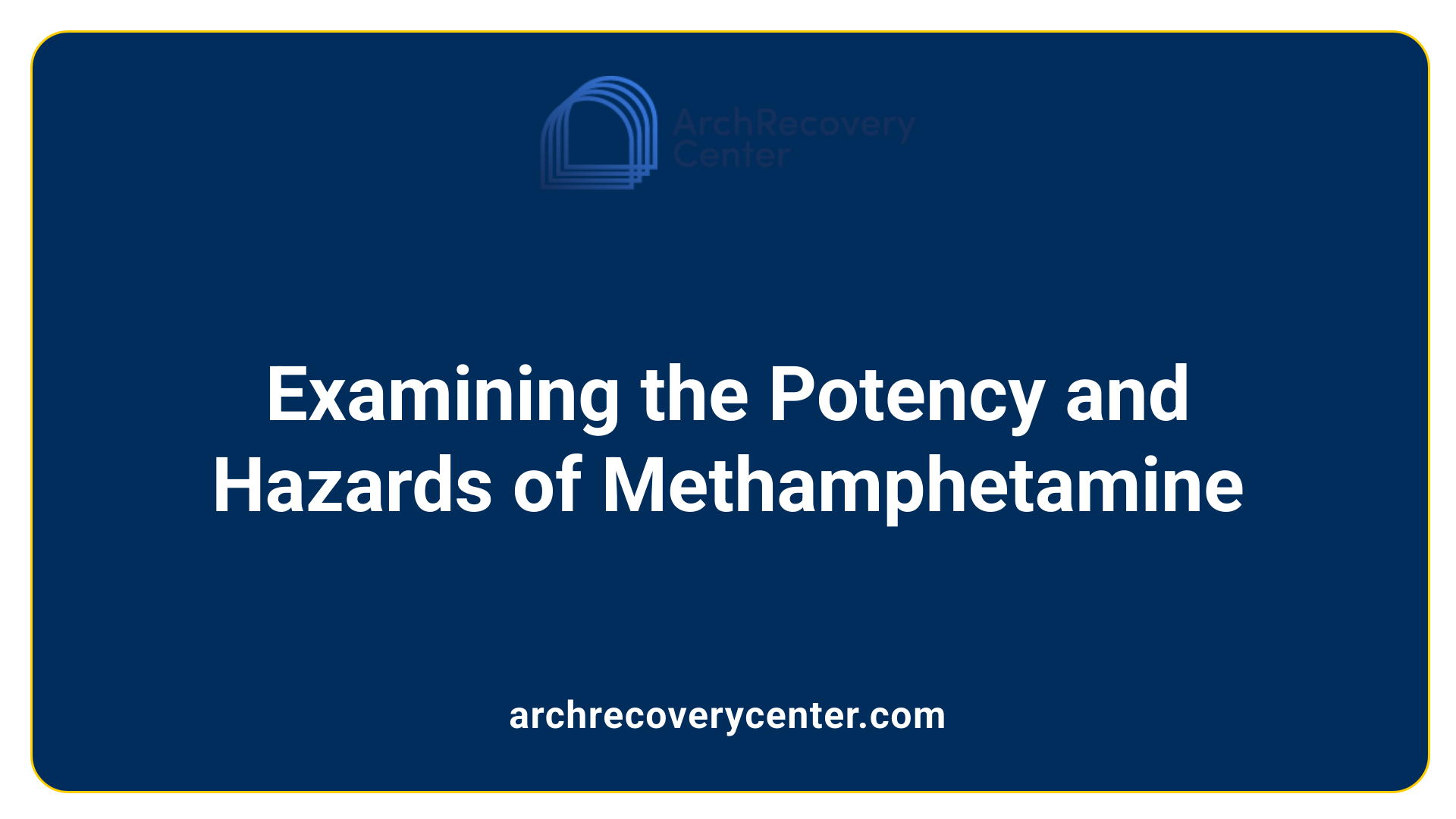
What is Methamphetamine?
Methamphetamine, often referred to as "meth" or "speed," is a powerful central nervous system stimulant. It exists in various forms, with crystal meth, or "ice," being particularly notorious for its high purity and addictive qualities. Meth typically appears as colorless crystals or white powder, with a purity that can reach up to 80% compared to traditional speed, which is less potent.
How Does It Work?
This stimulant increases neurotransmitter activity in the brain, particularly dopamine, leading to heightened energy, alertness, and an intense euphoric rush. Users often experience effects almost immediately, especially when smoked or injected, creating a highly addictive feedback loop.
Addictive Potential and Health Implications
Methamphetamine is incredibly addictive due to its rapid onset of euphoria and the methods of use that facilitate quicker absorption. Regular use can lead to severe dependency, with withdrawal symptoms that include intense cravings, depression, and anxiety. Long-term consequences include significant cardiovascular issues, memory loss, and even permanent brain damage.
| Aspect | Methamphetamine | Health Risks |
|---|---|---|
| Addiction Potential | Extremely high | Compulsive use, increased cravings |
| Withdrawal Symptoms | Severe depression, anxiety, irritability | Extended duration, lasting weeks |
| Long-term Effects | Cardiac problems, psychosis, cognitive impairment | Higher risk of overdose affecting health |
Methods of Use and Effects on the Body
Ways speed can be ingested
Speed, a powerful stimulant primarily composed of methamphetamine, can be ingested through various methods. Users typically choose one of the following:
- Snorting: This method allows the drug to enter the bloodstream quickly, producing effects almost immediately.
- Injecting: This provides rapid and intense effects, but carries significant risks of overdose and infection.
- Smoking: Especially common with crystal meth (also known as ice), this method produces a fast-acting euphoria.
- Orally: Consuming pills or tablets may result in effects taking longer to kick in, generally starting within 15-20 minutes.
Immediate and long-term effects on health
The effects of speed can be both immediate and long-lasting, impacting various body systems:
- Immediate effects: Users often experience increased energy, heightened alertness, euphoria, and decreased appetite. However, these can be accompanied by anxiety, paranoia, and an elevated heart rate.
- Long-term effects: Prolonged use can lead to severe health issues, including cardiovascular problems, psychosis resembling schizophrenia, memory loss, and addiction. Users may suffer from mood swings and experience physical exhaustion and depression during withdrawal phases.
| Method of Use | Time to Effect | Risks |
|---|---|---|
| Snorting | Immediate | Nosebleeds, potential for damage |
| Injecting | Immediate | Risk of overdose, infection |
| Smoking | Immediate | Respiratory issues, dependence |
| Oral | 15-20 mins | Slower onset, potential for misuse |
| Effects | Immediate Effects | Long-term Effects |
|---|---|---|
| Speed | Euphoria, energy | Addiction, psychosis |
| Methamphetamine | Intense euphoria, wakefulness | Heart problems, memory loss |
Understanding these methods and effects underscores the necessity of responsible use, especially given the legal and health implications.
Legal Status and Societal Impacts
Legal classification of speed
Speed, primarily referring to methamphetamine, is classified as a Class B drug in many jurisdictions, including the UK, indicating it is illegal to possess or distribute. In the United States, methamphetamine exists as a Schedule II stimulant as per the DEA, meaning it has a high potential for abuse and can lead to severe psychological or physical dependence. While some amphetamines, like dextroamphetamine, are legally prescribed for conditions such as ADHD, the misuse of speed remains a significant legal issue.
Consequences of illicit use
The illicit use of speed has profound societal impacts, contributing to rising drug addiction rates and associated health crises. Users often face legal penalties for possession and trafficking, which can lead to imprisonment. Moreover, communities experience increased healthcare costs due to overdoses and treatment for related complications, including mental health disorders. The stigma surrounding substance abuse can hinder users from seeking help, perpetuating a cycle of addiction and societal challenges.
Coping with Addiction and Withdrawal
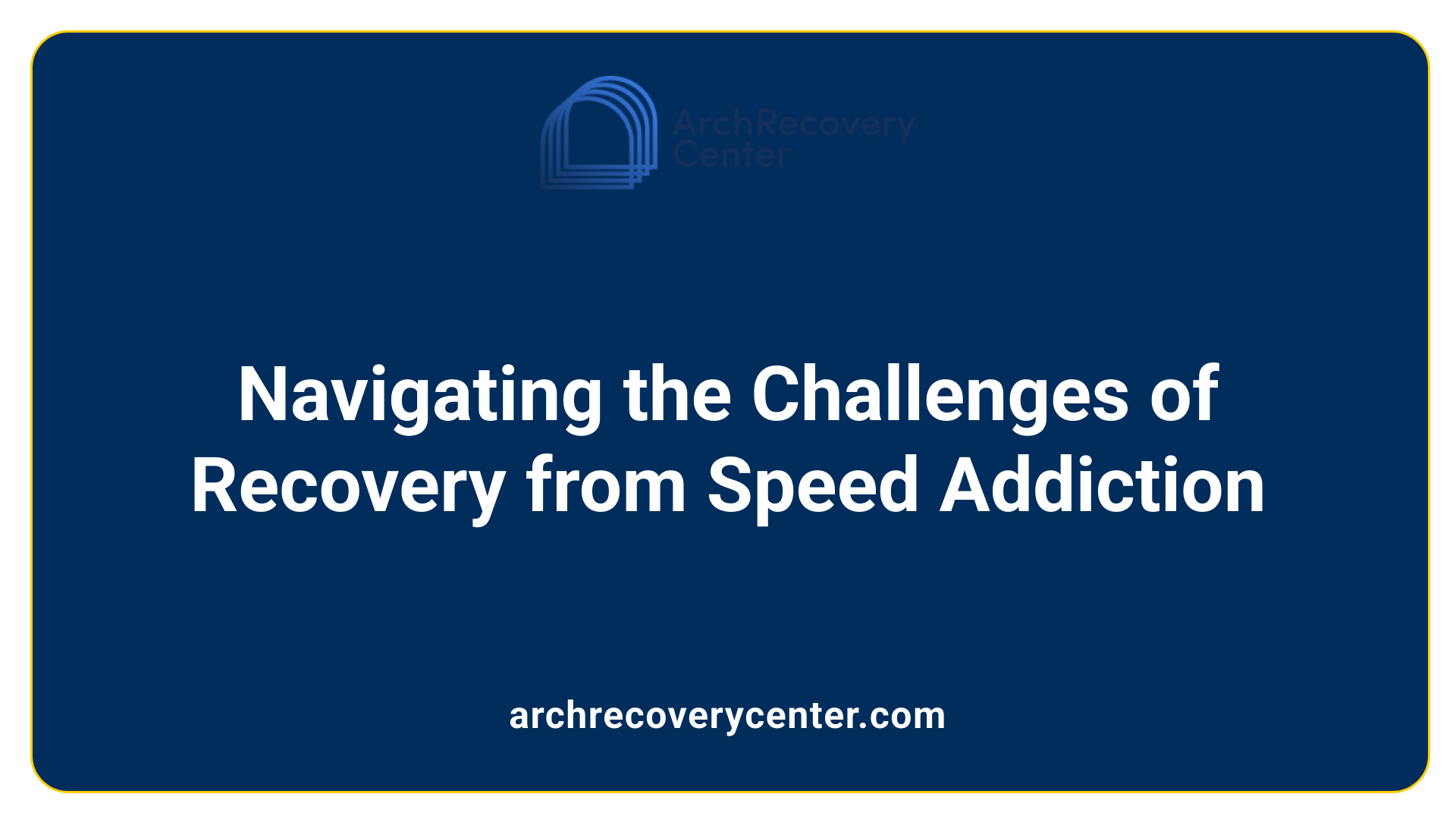
Symptoms of withdrawal from speed
Withdrawal from speed, a form of amphetamine, can be challenging. Common symptoms include:
- Severe exhaustion: Users may feel extremely fatigued after stopping.
- Intense cravings: A strong desire to use the drug can resurface.
- Mood swings: Individuals might experience heightened irritability or mood fluctuations.
- Depression: Feelings of sadness or despair often occur during withdrawal.
- Physical symptoms: Nausea, vomiting, and changes in appetite can also manifest.
These symptoms highlight the difficulty many face when trying to break free from dependence on amphetamines.
Support and treatment options
Seeking professional help is essential for coping with addiction to speed. Treatment options include:
- Behavioral Therapy: Programs that address the psychological aspects of addiction.
- Support Groups: Sharing experiences and coping strategies with others facing similar challenges.
- Counseling: Individual or group counseling can provide emotional support and strategies for recovery.
These approaches help individuals navigate the recovery journey, promoting healthier choices and lifestyles.
Duration and Detection of Speed in the System
How long does speed stay in your system?
Amphetamines, including speed, have varying detection times in the body depending on the type of drug test conducted.
Urine Tests:
- Detectable for 2-3 days after a single use.
- Chronic users may test positive for up to four days.
Blood Tests:
- Generally detectable for about 46 hours.
Saliva Tests:
- Can identify amphetamines for 24-48 hours post-use.
Hair Follicle Tests:
- Capable of revealing amphetamine usage for up to three months after the last dose.
What factors influence detection?
The duration amphetamines remain detectable can be influenced by several factors:
- Age: Older individuals may metabolize drugs more slowly.
- Metabolism: A person’s metabolic rate affects how quickly substances are eliminated from the body.
- Frequency of Use: Regular users may be detected longer than those who use occasionally.
Understanding these factors is critical for anyone concerned about the detection of amphetamines in their system.
The Complexities of Speed
Speed, as a substance rooted in amphetamines and methamphetamine, poses both intriguing and perilous challenges. While medicinally beneficial when appropriately managed, its potential for misuse and addiction underscores the need for awareness and caution. Understanding the multifaceted nature of speed—from its effects and risks to societal and legal ramifications—remains crucial for responsible usage and effective policy-making. In navigating the world of speed, we confront the dual edges of advancement and caution in drug use.
References
- Facts You Should Know about Speed (Amphetamines) - IDHS 4490
- amphetamine (speed) - Honest information about drugs | FRANK
- Amphetamines - DEA.gov
- Speed Drug: Effects & Health Warnings - Drugs.com
- Amphetamine - Wikipedia
- Which Drug Is Speed? Understanding Its Effects and Risks
- Methamphetamine | National Institute on Drug Abuse (NIDA)
Recent articles

The Link Between Detox and Spiritual Healing
April 16, 2025
Exploring the Union of Detoxification and Spiritual Renewal

How to Manage Financial Stress After Detox
April 16, 2025
Navigating Financial Recovery Post-Detox

How to Balance Independence and Support in Residential Treatment
April 16, 2025
Striking the Right Balance: Independence and Support in Residential Treatment

How Residential Treatment Helps Prevent Relapse
April 15, 2025
Exploring the Role of Residential Treatment in Sustaining Recovery

How to Support Children While Going Through Detox
April 15, 2025
Helping Children Cope During Parental Detox

How to Establish Trust with Therapists in Detox Programs
April 15, 2025
Building Trust with Therapists in Detox: A Pathway to Successful Recovery

The Role of Exercise in Detox and Residential Treatment
April 14, 2025
Harnessing Physical Activity for Effective Addiction Recovery

How to Manage Guilt and Shame in Early Recovery
April 14, 2025
Navigating Emotional Turbulence: Guilt and Shame in Recovery

The Role of Counseling During Detoxification
April 14, 2025
Exploring Counseling's Critical Role in Detox Recovery

How to Develop a Routine After Leaving Residential Treatment
April 11, 2025
Finding Stability After Leaving Rehab: Building Your New Normal

The Link Between Detox and Improved Mental Clarity
April 11, 2025
Exploring the Science Behind Detox and Cognitive Enhancements

The Benefits of Journaling During Detox and Residential Treatment
April 11, 2025
Harnessing the Power of Journaling for Recovery

How to Reconnect with Loved Ones After Detox and Treatment
April 10, 2025
Building Bridges After Addiction: A Guide to Reconnecting

How to Reconnect with Loved Ones After Detox and Treatment
April 10, 2025
Building Bridges After Addiction: A Guide to Reconnecting

What to Expect During the First 24 Hours of Detox
April 10, 2025
Navigating the Initial Hours of Alcohol Detoxification: What You Need to Know

How to Develop New Friendships After Detox
April 10, 2025
Building a Support System: Forming New Friendships in Recovery

The Importance of Building Self-Trust in Recovery
April 9, 2025
Building A Strong Foundation: Trusting Yourself in Addiction Recovery

How to Develop Healthy Coping Mechanisms in Residential Treatment
April 9, 2025
Establishing Resilience and Coping Skills for Sustainable Recovery

How to Strengthen Relationships After Addiction Recovery
April 9, 2025
Rebuilding Bonds Post-Recovery: A Guide to Nurturing Relationships

The Role of Holistic Therapies in Detoxification Programs
April 9, 2025
Exploring the Impact of Holistic Practices on Addiction Recovery

How to Build a Strong Support System in Residential Programs
April 9, 2025
Key Steps to Create Effective Support Systems in Residential Recovery Programs

How to Develop New Social Circles After Detox
April 9, 2025
Reimagining Social Connections Post-Detox

How Residential Programs Encourage Accountability
April 9, 2025
Exploring Accountability in Residential Care Settings

The Importance of Life Skills Training in Residential Treatment
April 9, 2025
Empowering Recovery Through Essential Life Skills

How to Develop Resilience Through Detox and Treatment
April 9, 2025
Building Emotional Strength in Recovery

The Importance of Celebrating Milestones in Recovery
April 9, 2025
How Celebrating Milestones Fosters Growth in Recovery

How to Support a Loved One Going Through Detoxification
April 9, 2025
Guiding Your Loved One Through Detox: Compassionate Strategies and Insights

How to Embrace Vulnerability in Residential Treatment
April 9, 2025
Unlocking the Power of Vulnerability in Treatment Settings

How to Develop Healthy Communication Skills in Recovery
April 3, 2025
Mastering Communication: A Key to Successful Recovery

How to Stay Focused on Recovery Goals After Detox
April 3, 2025
Strategies to Maintain Recovery Focus Post-Detox

How to Choose the Right Detox Program for Your Needs
April 3, 2025
Selecting the Best Detox Plan Tailored to Your Health Objectives

How to Develop Patience During Detox and Residential Care
April 3, 2025
Building Patience: A Key to Successful Detox and Recovery

The Benefits of Equine Therapy in Detox and Recovery
April 3, 2025
Harnessing Horses for Healing: A Transformative Path in Addiction Recovery

Why Building New Hobbies Supports Long-Term Sobriety
April 3, 2025
The Transformative Role of Hobbies in Sustaining Sobriety

The Role of Peer Mentorship in Detox and Recovery
April 3, 2025
Exploring the Impact and Structure of Peer Mentorship in Overcoming Addiction

How to Develop Healthy Tech Boundaries After Detox
April 3, 2025
Reclaiming Balance: Navigating Tech Use Post-Detox

The Role of Peer Support in Detox Programs
April 3, 2025
Unlocking the Potential of Peer Support in Detox Processes

I Need Outpatient Meth Treatment in Scranton PA
March 31, 2025
Discover outpatient meth treatment options in Scranton, PA for a clear path to recovery and support.

A Parents Compass: Navigating the Path to Help Sons with Drug Dependence
March 31, 2025
Discover how to help your son with drug dependence through support, prevention, and effective therapies.

How to Navigate Relationships in Early Recovery
March 31, 2025
Navigating Love and Bonding After Rehab

How to Create a Healthy Living Environment After Detox
March 31, 2025
Crafting a Sober Sanctuary Post-Detox

How to Develop a Growth Mindset During Recovery
March 31, 2025
Transitioning Towards a Sober Future with a Growth Mindset

Why Family Therapy is Critical After Detox and Treatment
March 31, 2025
The Role of Family Therapy in Post-Treatment Recovery

The Importance of Medical Supervision During Detoxification
March 31, 2025
Medical Supervision: A Critical Component in Detoxification Safety

The Emotional Impact of Detoxification and How to Cope
March 31, 2025
Navigating the Emotional Ups and Downs of Detoxification

How Detoxification Can Help Break the Cycle of Addiction
March 27, 2025
Unlocking the Role of Detox in Addiction Recovery

The Role of Support Groups After Detoxification
March 27, 2025
Harnessing Community: Support Groups as Pillars of Recovery Post-Detox

Why Establishing Healthy Routines Reduces Relapse Risk
March 27, 2025
Harnessing Routine to Fortify Against Relapse: The Underrated Power of Daily Structure

How to Handle Relapse Triggers in Early Recovery
March 27, 2025
Strategies to Tackle Early Recovery Challenges

How to Handle Emotional Triggers in Early Recovery
March 27, 2025
Navigating Emotional Triggers During the Recovery Journey

How Family Support Can Improve Detox Success
March 27, 2025
The Crucial Role of Families in Detoxification and Recovery

How Nature Therapy Supports Detox and Emotional Healing
March 27, 2025
Harnessing the Healing Power of Nature for Recovery and Emotional Balance

How Detoxification Prepares the Body for Long-Term Recovery
March 27, 2025
The Fundamental Role of Detox in Achieving Lasting Sobriety

The Link Between Detoxification and Emotional Healing
March 27, 2025
Understanding the Profound Connection Between Detoxification and Emotional Recovery

Average Human Attention Span Statistics
March 24, 2025
Unveil the truth about average human attention span statistics. Discover the factors and trends shaping our focus in this information-driven world.

How to Create a Personalized Self-Care Plan After Detox
March 24, 2025
Crafting Your Path to Well-being Post-Detox

How Medical Detox Reduces the Risk of Relapse
March 24, 2025
The Role of Medical Detox in Preventing Relapse

How Medical Detox Reduces the Risk of Relapse
March 24, 2025
The Role of Medical Detox in Preventing Relapse

The Role of Self-Reflection in Building Long-Term Sobriety
March 24, 2025
Harnessing the Power of Self-Reflection for Sustained Sobriety

Why Mindfulness Practices Improve Detox Outcomes
March 24, 2025
Unlocking the Benefits of Mindfulness for Effective Detox

Why Mindfulness Practices Improve Detox Outcomes
March 24, 2025
Unlocking the Benefits of Mindfulness for Effective Detox

How to Build Coping Skills in Residential Programs
March 24, 2025
Building Resilience and Managing Stress

The Role of Affirmations in Detox and Emotional Healing
March 24, 2025
Harnessing the Power of Positive Affirmations for Recovery

How to Manage Boredom Without Turning to Substances
March 24, 2025
Finding Fulfillment Beyond Quick Fixes: Boredom Strategies for Recovery

Why Residential Treatment is Critical After Detox
March 24, 2025
The Essential Step After Detox: Residential Treatment

The Importance of a Safe Environment During Detoxification
March 24, 2025
Creating Safe Havens: The Role of Environment in Detox Success

How to Embrace Change in Detox and Recovery
March 24, 2025
Navigating the Waves of Change for a Successful Recovery

Understanding the Role of Alternative Therapies in Recovery
March 24, 2025
Exploring Complementary Paths in Addiction and Health Recovery

How to Stop My Sugar Addiction
March 24, 2025
Breaking Free from the Sweet Escape: Conquering Sugar Addiction

The Role of Relapse in Recovery and How to Bounce Back
March 24, 2025
Understanding Relapse and Resilience in Addiction Recovery

The Role of Support Groups in Maintaining Sobriety After Residential Treatment
March 24, 2025
Harnessing the Power of Support Groups for Lasting Recovery

How Prescription Drug Rehab Programs Address Psychological Dependency
March 24, 2025
Unpacking Psychological Dependency in Medication Rehab

How to Help an Alcoholic
March 24, 2025
Comprehensive Strategies for Supporting Alcoholic Loved Ones

How to Create a Relapse Prevention Plan After Residential Treatment
March 24, 2025
Crafting a Personalized Path to Sustainable Recovery

Symptoms of Cocaine Withdrawal
March 19, 2025
Understanding the Complexities of Cocaine Withdrawal Symptoms

The Importance of Setting Goals for Long-Term Sobriety
March 19, 2025
Goal-Setting: A Catalyst for Achieving Sustained Sobriety

Who Qualifies for Free Rehab Centers?
March 19, 2025
Navigating the Path to Free Drug and Alcohol Rehab Services

Holistic Approaches to Long-Term Sobriety
March 19, 2025
Embracing the Whole Self in Recovery

Breaking Down the Stages of Addiction Recovery
March 19, 2025
Understanding the Journey Through Addiction Recovery

The Role of Residential Treatment in Opioid Addiction Recovery
March 19, 2025
Exploring the Impact of Residential Treatment on Opioid Addiction

How Long Does It Take to Break a Porn Addiction
March 19, 2025
Understanding the Recovery Timeline for Porn Addiction

Accredited Drug Treatment Centers in Langhorne PA
March 19, 2025
Discover the Best Accredited Drug Treatment Facilities in Langhorne

The Importance of Forgiveness in Recovery
March 19, 2025
Unlocking Healing: The Role of Forgiveness in Addiction Recovery

How Does Detox Impact the Brain and Body?
March 19, 2025
Exploring the Effects of Detox on Brain Function and Overall Health

Welcome StR Alumni of Addiction Treatment
March 19, 2025
Discover the Power of Community in Addiction Recovery

How Detox Centers Provide Emotional Support During Withdrawal
March 19, 2025
The Crucial Role of Emotional Support During Withdrawal

Types of Mental Disorders
March 19, 2025
Understanding the Diverse Spectrum of Mental Health Conditions

How to Break Phone Addiction Adhd
March 19, 2025
Managing Smartphone Dependence for Those with ADHD

How to Stop Sugar Addiction
March 19, 2025
Breaking Free from Sugar: Understanding and Overcoming Your Addiction

What Is Suboxone?
March 19, 2025
Exploring the Role and Mechanics of Suboxone in Opioid Addiction Treatment

How to Support a Loved One Through Detox and Residential Treatment
March 19, 2025
Navigating Detox and Treatment: A Supporter's Guide

The Role of Medication-Assisted Treatment in Recovery
March 19, 2025
Exploring the Impact of Medication-Assisted Treatment on Substance Use Recovery

Drugs Are All Around
March 19, 2025
Exploring the Omnipresence of Drugs in Modern Society

The Importance of Aftercare Planning in Prescription Drug Rehab
March 19, 2025
Unlocking Success: How Aftercare Planning Sustains Recovery in Drug Rehab

Three Common Symptoms of Withdrawal
March 19, 2025
Understanding the Symptoms of Withdrawal

5 Dangerous Designer Drugs
March 19, 2025
Unmasking the Threats of Synthetic Drugs

I Dreamed About Using Drugs – What Does That Mean?
March 19, 2025
Unpacking the Subconscious: The Meaning Behind Drug Dreams

The Connection Between Childhood Trauma and Addiction
March 19, 2025
Unraveling the Ties Between Early Trauma and Addictive Behaviors

Am I Going Through Opiate Withdrawal?
March 19, 2025
Recognizing and Managing Opiate Withdrawal

Managing Stress Without Substances During Recovery
March 19, 2025
Exploring Substance-Free Stress Management in Recovery

